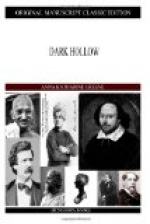Surprised, almost touched, she held out her hand, with a cordial thank you, in which emotion struggled with her desire to preserve an appearance of complete confidence in Judge Ostrander, and incidentally in his son. Then, being on her feet by this time, she turned to go, anxious to escape further embarrassment from a perspicacity she no longer possessed the courage to meet.
The lawyer appeared to acquiesce in the movement of departure. But when he saw her about to vanish through the door, some impulse of compunction, as real as it was surprising, led him to call her back and seat her once more in the chair she had so lately left.
“I cannot let you go,” said he, “until you understand that these insinuations from a self-called witness would not be worth our attention if there were not a few facts to give colour to his wild claims. Oliver Ostrander was in that ravine connecting with Dark Hollow, very near the time of the onslaught on Mr. Etheridge; and he certainly hated the man and wanted him out of the way. The whole town knows that, with one exception. You know that exception?”
“I think so,” she acceded, taking a fresh grip upon her emotions.
“That this was anything more than a coincidence has never been questioned. He was not even summoned as a witness. With the judge’s high reputation in mind I do not think a single person could have been found in those days to suggest any possible connection between this boy and a crime so obviously premeditated. But people’s minds change with time and events, and Oliver Ostrander’s name uttered in this connection to-day would not occasion the same shock to the community as it would have done then. You understand me, Mrs. Scoville?”
“You allude to the unexplained separation between himself and father, and not to any failure on his part to sustain the reputation of his family?”
“Oh, he has made a good position for himself, and earned universal consideration. But that doesn’t weigh against the prejudices of people, roused by such eccentricities as have distinguished the conduct of these two men.”
“Alas!” she murmured, frightened to the soul for the first time, both by his manner and his words.
“You know and I know,” he went on with a grimness possibly suggested by his subject, “that no mere whim lies back of such a preposterous seclusion as that of Judge Ostrander behind his double fence. Sons do not cut loose from fathers or fathers from sons without good cause. You can see, then, that the peculiarities of their mutual history form but a poor foundation for any light refutation of this scandal, should it reach the public mind. Judge Ostrander knows this, and you know that he knows this; hence your distress. Have I not read your mind, madam?”
“No one can read my mind any more than they can read Judge Ostrander’s,” she avowed in a last desperate attempt to preserve her secret. “You may think you have done so, but what assurance can you have of the fact?”




